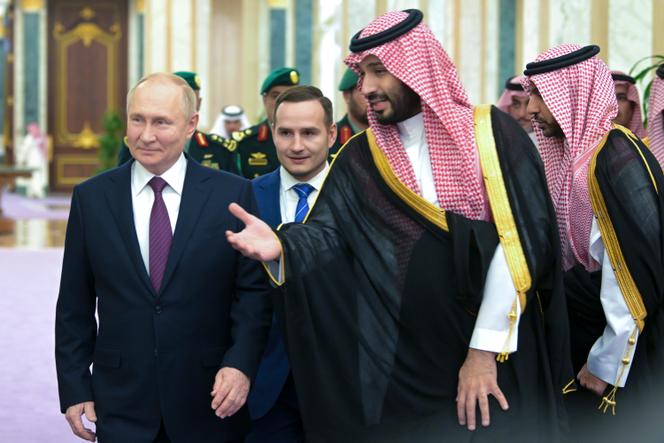


Escorted by four Su-35 fighter jets, Russian President Vladimir Putin's plane landed in the United Arab Emirates on Wednesday, December 6, and a few hours later in Saudi Arabia. This working visit was also the Russian leader's first visit to the Gulf region since his invasion of Ukraine in February 2022.
Putin, who is under an arrest warrant for war crimes in Ukraine, rarely leaves Russia, except to visit countries or regions that have not ratified the statutes of the International Criminal Court in The Hague, like Iran, China, and the Gulf, which issued the warrant against him in March.
His whirlwind trip was aimed at strengthening Russia's financial partnerships with these two oil-producing states, which have remained neutral in the Ukrainian conflict and are not applying the sanctions imposed on Moscow. It is also a challenge to the "collective West" and its attempts to isolate Russia's number one on the world stage. To prove that this is not the case, Putin, just back from his tour, was due to receive Iranian President Ebrahim Raisi at the Kremlin on Thursday. While serving to strengthen relations with these countries, the visits are also a "signal to the international community," said Yuri Ushakov, the president's diplomatic adviser.
Meeting in Abu Dhabi with his counterpart Mohammed bin Zayed Al Nahyan, Putin welcomed the "unprecedented level" of trade between their two countries, $9 billion in 2022, an increase of 68% on the previous year. Since the sanctions against Russia, the Emirate has become the hub of Russia's commercial activities. Russian oil traders moved there from Europe, Russian money has flown into its banks, and many businessmen have set up shop in Dubai, which has become the preferred transit point for many of the dual-use goods destined for Russia's defense industry.
Alarmed by this circumvention, the United States, the European Union and the United Kingdom sent delegations to Russia to try to resolve the problem. In October, the US Treasury imposed sanctions on an Emirati company for violating price caps on Russian oil. Emirati banks have since become more demanding of customers involved in trading Russian crude, oil products and raw materials.
After a few hours in Abu Dhabi, Putin flew to Riyadh where Crown Prince Mohammed bin Salman was waiting for him. The two leaders held three hours of face-to-face talks, focusing mainly on energy cooperation and the situation in Gaza.
The two partners cooperate within OPEC+, an informal cartel of 23 countries committed to cutting production, a strategy designed to prevent a fall in oil prices. This rapprochement is here to stay. In January 2024, Saudi Arabia, the Emirates and Iran, three major producers of black gold, will join BRICS (Brazil, Russia, India, China and South Africa), which already includes the two biggest oil consumers, India and China, alongside two oil giants, Russia and Brazil. This reconfiguration will transform the BRICS into a kind of OPEC 2.0, likely to carry its full weight on the market.
You have 35% of this article left to read. The rest is for subscribers only.
